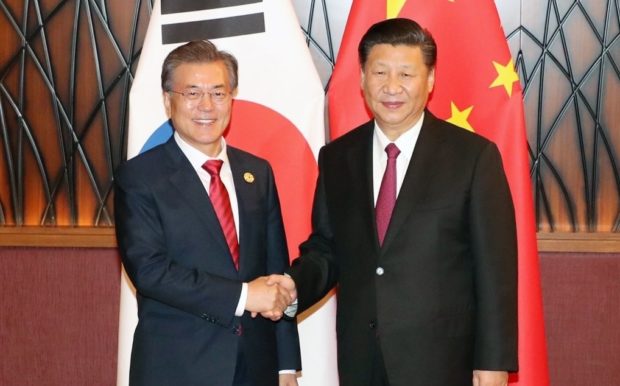Xi visit to Seoul aimed at winning over Korea amid feud with US—experts

South Korean President Moon Jae-in (L) and Chinese President Xi Jinping (R). Yonhap via The Korea Herald/Asia News Network
SEOUL — Chinese President Xi Jinping will seek to persuade South Korea to not heavily invest in anti-China initiatives led by the US if he visits here, experts said Sunday, although his trip is unlikely to happen this year due to coronavirus concerns.
Cheong Wa Dae said Saturday that the two countries agreed the Chinese leader will travel to Korea “at an early date” once the COVID-19 situation stabilizes. Beijing confirmed Seoul is a “priority” for Xi to visit, it added.
The announcement came after President Moon Jae-in’s national security adviser Suh Hoon met with Yang Jiechi, a member of the Politburo of the Chinese Communist Party, in Busan and discussed “comprehensive topics” including coronavirus responses, trade and denuclearization in the first senior-level talks between two countries since late last year.
Xi’s visit, if realized, would mean the normalization of Seoul-Beijing ties, which became frayed over Seoul’s deployment of an American advanced missile defense system in 2017, according to Nam Sung-wook, a Korea University professor teaching diplomacy and security.
China, claiming the weapons were targeting its mainland, retaliated against Korean companies doing business there and banned tourists from traveling here. Seoul disagreed with Beijing’s claim, and filed complaints to the World Trade Organization seeking redress.
Article continues after this advertisementOther experts pointed out that the confirmation of Xi’s visit here shows how eager China is to draw support from Korea, its Asian neighbor and a long-term US ally, amid the prolonged US-China feud over the pandemic, trade and other global issues.
Article continues after this advertisement“Given the fight showing no sign of easing up, China increasingly feels it needs some support. And Korea is a very attractive neighbor who could provide just that,” said Park Won-gon, who teaches international studies at Handong Global University in Korea.
“It (the trip) is all meant to discourage Seoul from teaming up in an anti-China coalition backed by Washington.”
Experts explained that China, seen by some as domineering on the international stage, was eyeing Korea’s backing for a reason, as it continues a hard line on the US.
“Seoul was relatively ‘neutral’ on contentious US-China issues, Hong Kong’s national security law, for instance. But Tokyo wasn’t,” said Hwang Ji-hwan, an international relations professor at the University of Seoul.
President Xi was set to visit Japan in April, but had the trip postponed due to the coronavirus pandemic. But the work to welcome Xi essentially came to a halt as Japan‘s ruling party opposed the trip, citing the controversial Hong Kong law, according to local news reports there.
Some experts warned that China could demand something for the state visit to open.
“China could seek trade-offs. It could ask Korea not to take part in the US-led ban on Huawei for the visit to happen,” said Shin Beom-chul, director of the Center for Diplomacy and Security at the Korea Research Institute for National Strategy.
The US is leading the campaign against the Chinese technology company and its affiliates to prevent their access to commercially available chips.
Shin added, “China will make decisions, but after it sees how Korea responds to its offer.”